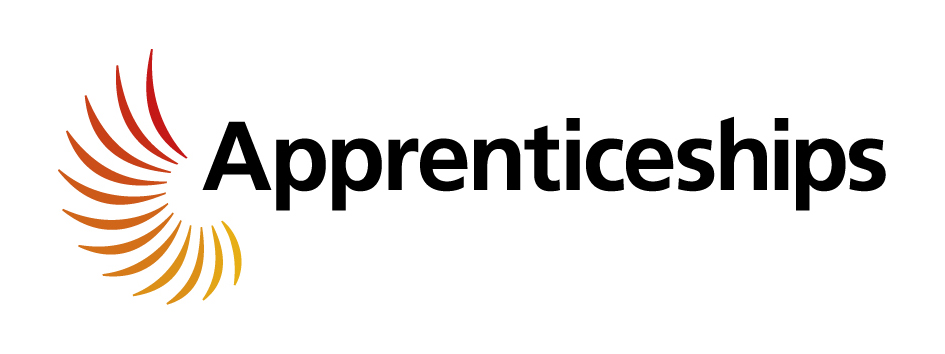You are here
- Home
- Apprenticeships
- Information for employers
Information for employers
Apprenticeships are a job with training; in other words, they combine working with studying. Apprenticeships provide and assess the knowledge, skills and behaviours that apprentices need within a specific job role.
Hiring an apprentice is a productive and effective way to grow talent and develop a motivated, skilled and qualified workforce.
Apprenticeships unlock the potential of your employees. They are a way to grow-your-own talent whilst developing your workforce to meet the future needs of your organisation.
Learn how apprenticeships can energise your organisation, delivering new skills and expertise to future-proof your workforce.
 |
| Skills shortage by equipping your staff with in-demand expertise that can be costly to recruit |
 |
| Recruitment and retention problems by allowing organisations to attract new talent, as well as upskill and promote from within |
 |
| Succession planning by creating future leaders from your current staff |
 |
| Diversity challenges by widening participation through more flexible learning |
In the following video, an employer who works with The Open University talks about the benefits for their organisation.
Kent Community Health NHS Foundation Trust
You should also consider apprenticeships if your organisation needs to:
- Support workforce transformation through leadership skills and knowledge sharing.
- Improve productivity in the workplace.
- Developing managers to become better leaders.
- Recruit and retain top talent by providing a clear development pathway.
In the UK, employers are responsible for paying their apprentices' salaries, but training costs can be funded through the Apprenticeship Levy or part-funded through Government funding. The funding method for an apprenticeship is determined at the start of each apprentice’s programme.
The Levy requires organisations with a pay bill of more than £3m to pay 0.5% of that bill to support apprenticeships. However, any employer can access funding for an apprentice, whether they pay the Levy or not.
There are different funding schemes across the UK nations. Each UK nation manages its own apprenticeship programmes, including how funding is spent on apprenticeship training. More information, including links to the Welsh apprenticeship system, can be found on the UK Government apprenticeship funding website.
England
Levy-paying employers in England can use funds in their Apprenticeship Service Account to fund apprenticeship training costs, and they will also receive a 10% Government top-up into this account.
For non-levy paying employers, the Government will fund 95% of the cost of training an apprentice, with a 5% contribution from the employer. Funding can be reserved through the Apprenticeship Service form non-levy organisations.
If you employ fewer than 50 people (including the apprentice), and have an apprentice who is aged 16-18 years or 19-24 with an education and healthcare plan, the government will fund 100% of the apprenticeship. Find out more on England’s Apprenticeship website.
If you have staff in England, use The Open University's apprenticeship levy calculator for an indication of the amount of funded degree apprenticeships you could run in your organisation, based on the funding you'll receive from your first-year apprenticeship levy payments. Just fill in the details and press submit.
Contact us to find out the costs of The Open University higher and degree apprenticeship programmes.
Further information on the apprenticeship levy in England can be found on the Education and Skills Funding Agency website, including information for non-levy payers on co-investment.
Note: Please use numbers only in the calculator.
Disclaimer: This tool is for illustration purposes only. The actual amount of levy you will pay and the actual number of degree apprentices you will be able to fund may vary. For example, this tool may underestimate or overestimate the number of apprentices depending on the actual cost of the Degree Apprenticeship. The Open University is not responsible for the consequences of any decisions or actions taken in reliance on the information provided by this tool.
Wales
In Wales, employers are responsible for paying their apprentice’s salary, but training costs (tuition fees) are funded by the Welsh Government. There are some financial incentives available to encourage employing apprentices, depending on the needs of the workforce at the time. For more information visit the Higher Education Funding Council for Wales (HEFCW).
It is easier than you think to employ or train an apprentice and The Open University (OU) provides employers with a range of supporting information and material to make the process as smooth as possible.
Our delivery team is available and responsive face-to-face, or by email and phone.
Our dedicated apprenticeship team will support you and your apprentices, providing:
- A dedicated Account Manager to advise on and discuss your strategic and operational needs.
- An Apprenticeship Programme Delivery Manager to support you throughout your apprentice's programme(s).
- Highly-qualified academic staff, with current relevant industry experience.
- Regular contact through meetings with practice tutors, your Account Manager and your Apprenticeship Programme Delivery Manager.
- Information sessions for apprentice line managers and free online learning for mentors to develop the skills they need to support apprentices effectively.
- Flexible learning delivered around the demands of the apprentice and the organisation.
- A high-quality work-based learning approach that embeds learning into the workplace.
- Advice on apprenticeships and funding; we understand that getting to grips with apprenticeships and the Levy isn’t straightforward and our team can help with any questions or uncertainties.
Timings
As with most things, it is best to allow sufficient planning time before starting new apprenticeship programmes. The process can take many months for some employers, while others will already have a firm idea of what they want and will be ready to proceed faster. We will always work with you and adapt to your deadlines wherever possible.
To learn more, contact us.
Find out more about how The Open University supports apprentices and employers by clicking the buttons below.
Using The Open University’s tried-and-trusted educational technology, our programmes are delivered flexibly around apprentices’ personal lives and the demands of your organisation.
The tutor-supported online learning is both varied and interactive, with multiple rich media formats that engage and enthuse apprentices on their journey. Learning can be accessed 24/7 on computers, tablets and mobile devices, so apprentices can study at home, work and on the move. Online tutorials, forums and discussion groups allow apprentices to learn from different industries and backgrounds.
An apprenticeship is a job with a formal programme of training which meets the requirements of the Apprenticeship Standard (in England), Framework (in Wales). The time that employers must allocate to this training can vary between programmes. The planned training hours will be detailed in the Training Plan. Note that in England and Wales, this time is called 'off-the-job training' in England and in Scotland, it is called 'protected time'. This is time for the apprentice to engage in the learning with the OU during their contracted working hours.
For full guidance visit: Gov.uk.
The Open University’s flexible, blended learning approach makes it a lot easier for employers to effectively manage off-the-job training, while minimising the impact on productivity in the workplace.
 |
 |
Programmes we offer
Disability support
Find out how we can help your organisation
Please contact us to speak to one of our business team advisors.
Not on our mailing list?
Sign up to receive regular emails that are full of advice and resources to support staff development in your organisation.
